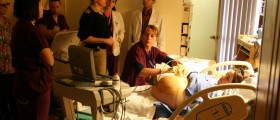
Fetal alcohol syndrome refers to a set of mental and physical defects that develop in unborn babies if the mother consumes alcohol during pregnancy. There are many important factors associated with risk of developing fetal alcohol syndrome, and not every intake of alcohol results in this defect. The timing, frequency and quantity of alcohol are important with regard to the risk of fetal alcohol syndrome. However, no amount of alcohol is proven safe for consumption during pregnancy.
It is estimated that in the United States each year approximately 40.000 babies are born with some type of alcohol-related damage. Fetal alcohol exposure is the leading known cause of intellectual disability in the Western world. Regardless of the terrifying stats, in the United States, 10–15% of pregnant women report having recently used alcohol, and up to 30% use alcohol at some point during pregnancy.
Symptoms of fetal alcohol syndrome
Fetal alcohol syndrome does not result in one single birth defect. Rather, it is a pattern of serious health problems ranging from physical defects to mental retardation. The severity of symptoms varies from child to child including problems in growth deficiency, facial features, central nervous system and other abnormalities.
Signs of fetal alcohol syndrome may include distinctive facial features, such as small eyes or very thin upper lip, short nose or smooth skin surface between the nose and upper lip. Other physical signs include deformities of joints, limbs and fingers, small head circumference and brain size, slow physical growth, and vision or hearing problems.
Mental problems associated with fetal alcohol syndrome include mental retardation and delayed development, various learning disorders, problems with concentration, problems with sleeping and different types of abnormal behavior such as attention problems, hyperactivity, poor impulse control, nervousness and anxiety.
Causes of fetal alcohol syndrome
It is considered that light to moderate drinking during pregnancy does not appear to pose a risk to the fetus. Certain studies conducted on pregnant women revealed that no adverse effects on children were found when consumption of alcohol was under 8.5 drinks per week. Fetal alcohol syndrome apparently occurs only among alcoholics. This happens because when the mother drinks alcohol it enters the bloodstream and reaches the fetus. Fetus, however, needs more time to metabolize alcohol so that alcohol concentration in baby’s blood becomes much higher than those in mother’s body. Another side-effect of alcohol is that it obstructs the delivery of oxygen and nutrition to baby's developing tissues, organs and brain.
If a woman is pregnant and she finds it difficult to stop drinking, she should ask her obstetrician or other health care provider for help.

















Your thoughts on this
Loading...